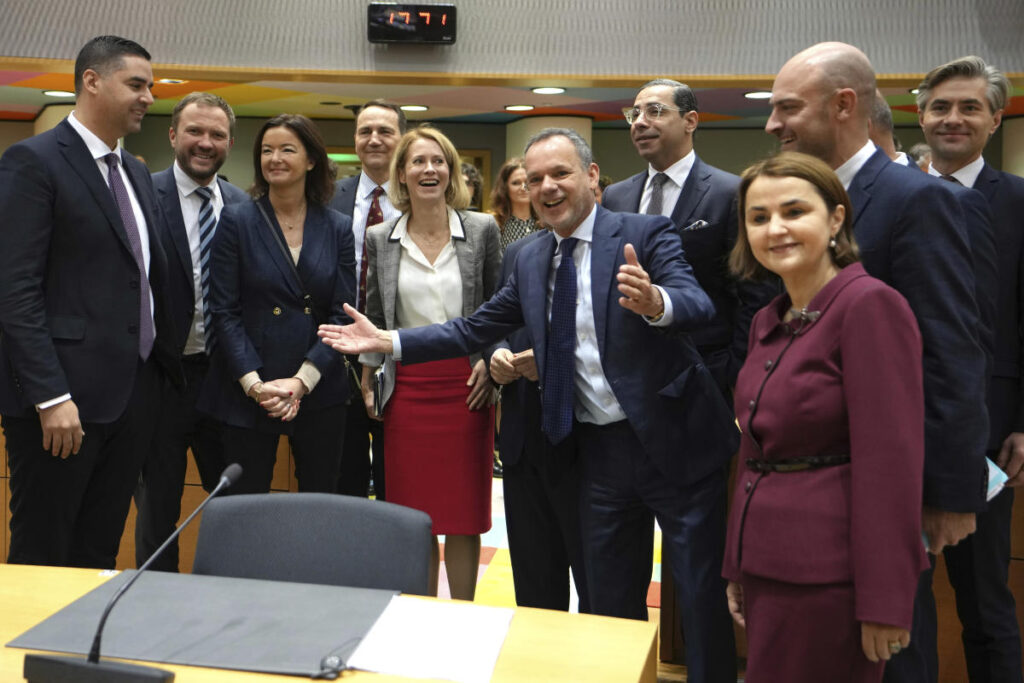On Monday, the European Union escalated its response to Russia’s ongoing war in Ukraine by announcing a new round of sanctions aimed at a wide array of individuals and entities assisting in this conflict. Among those sanctioned are prominent figures linked to North Korea’s defense sector, specifically Defense Minister No Kwang Chol and Deputy Chief of the Armed Forces General Staff Kim Yong Bok. These officials have been implicated in military collaborations with Russia, including the reported deployment of North Korean troops to support Russian operations. The sanctions also extend to a military unit that has been associated with an attack on a children’s hospital in Kyiv, highlighting the EU’s commitment to targeting those responsible for humanitarian crises resulting from the war.
In a significant move to disrupt Russia’s logistical capabilities, the EU has targeted its extensive “shadow fleet” of ships, which are used to evade international restrictions related to oil and gas shipments, as well as the transport of stolen Ukrainian grain. A total of 52 vessels have now been added to the list of ships banned from European ports, depriving them of essential services and further isolating Russia economically. EU foreign policy chief Kaja Kallas emphasized that these sanctions are designed to weaken the operational capacity of Russia’s military and those nations that are enabling them, which includes entities from China.
The sanctions package also involved asset freezes for 54 individuals and 30 entities, a move that reflects the EU’s comprehensive approach to exerting economic pressure on Russia. The measures taken since the onset of the conflict in February 2022 have now targeted over 2,300 individuals and entities, showcasing the EU’s sustained commitment to hold accountable those facilitating aggression against Ukraine. This thorough strategy includes not only punitive actions but also travel bans for sanctioned officials, further restricting their ability to engage internationally.
In addition to Russian and North Korean targets, the sanctions have extended to several companies, including those in the defense sector and a chemical plant, with implications for the Russian military supply chain. Notably, a civilian airline that provides logistical support to Russian armed forces has also fallen under these sanctions, indicating a broadening of the target list to encompass any entity seen as contributing to military operations against Ukraine. The EU’s proactive stance is aimed at increasing pressure on Russia by hindering its capabilities and economic resources.
Furthermore, the sanctions have implicated Chinese nationals accused of supplying critical components such as drone parts and electronic equipment to Russian military endeavors. This reflects the EU’s intent to address not only direct Russian actions but also the international networks that support them. Interests from countries including India, Iran, Serbia, and the UAE have also been highlighted for their roles in circumventing EU sanctions and aiding Russia’s military infrastructure, indicating a far-reaching approach that seeks to curb not just Russian actions but the global support network that enables them.
In summary, the EU’s latest sanctions package represents a decisive and multifaceted approach to counter Russia’s military aggression in Ukraine by targeting key officials, military units, and companies supporting the war effort. By going after not only Russian entities but also those from North Korea and other nations aiding Russia, the EU aims to weaken the war machine and support the Ukrainian people politically, economically, and militarily. The continuation of these sanctions underscores the EU’s commitment to its principles of international law and humanitarian protection amidst ongoing geopolitical tensions.

